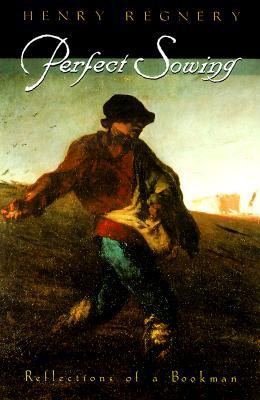Henry Regnery (1912-1996), as Jeffrey Nelson observes in his introduction, was “one of the unsung heroes of the last half-century of American cultural life.” Henry Regnery Company (now Regnery Publishing, Inc.), which he founded in 1947, gave America’s nascent conservative movement a beachhead in the monolithically liberal publishing world: The breakthrough was the publication of Russell Kirk’s The Conservative Mind, which Regnery deemed “the high point of my publishing career.” He also published James Burnham, Richard Weaver, and other conservative giants. As the leading publisher of revisionist histories of World War II, Regnery effectively disputed liberalism’s effort to prune truth into a self-serving “official” version of events. Defending civilization on another front, he published many works of classical and Catholic thought.
As this second posthumous collection of his writings (the first, A Few Reasonable Words, was published by the Intercollegiate Studies Institute in 1996) reminds us, there was another side to Henry Regnery: the accomplished essayist and reviewer. These pieces—many of them originally published in Modern Age, others making a first appearance here—reveal the quality of Regnery’s prose style (lucid, vigorous, but never strident) as well as the depth and breadth of his mind. Spanning the period from 1969 to 1994, their subjects range from memoirs of his father and his upbringing to books and authors (some of whom he published); higher education in America and Germany; major contributors to culture in Chicago, such as University of Chicago president Robert M. Hutchins and architect Louis Sullivan; philosophy and religion; and publishing.
Reflecting the book’s title, kernels of discernment and wisdom lie thick on the pages. Regnery traces the decline of higher education to liberals’ presumption in turning universities into society’s problem-solvers. Regarding the contemporary moral climate, he observes that “licentiousness is only a sign of a much deeper disorder, a loss of faith”; the state of modern literature he attributes to the fact that many modern novels “are written for people whose mental horizons are strongly influenced, if not determined, by television.” His account of his innocent upbringing, close-knit neighborhood, and demanding education in Hinsdale, Illinois, reveals how much America has lost since then—that “change is not always progress, nor greater convenience necessarily an improvement in the human condition.” Regnery offers concise but richly informative introductions to the thought of Wyndham Lewis, Whittaker Chambers, and Catholic theologian Romano Guardini, and to the life and work of poet Roy Campbell.
This superb collection is no mere miscellany; unifying themes and patterns emerge. One is Regnery’s celebration of exemplars of heroic, civilized men—men combining vitality and integrity, who stood by their beliefs, grappled robustly with life, loved it dearly, and lived it fully, making the most of their situations and meeting adversity manfully. He gives us his father William, “a disciplined, mature man” before he was 20, then a keen businessman, principled employer, and wonderful father; young Russell Kirk, seizing every chance to write and publish; Lewis, “who lived in his time with all the intensity of his mind and personality” while battling those who set its trend and tone, standing firm despite unpopularity, blindness, and poverty. Regnery lauds Sullivan’s autobiography for “the sense it conveys of [the author’s] having lived his life to the full, of having taken advantage of its opportunities, and met its challenges,” and salutes Campbell for his willingness to risk his life and reputation for causes in which he believed.
Regnery’s abiding, penetrating concern was for publishing and its impact on society for good or evil. The publisher’s power to select manuscripts, Regnery keenly observes, enables him to influence what is read, hence to affect his time’s ideas and literary standards. Simultaneously, he must be a savvy businessman. The serious publisher “walks a narrow path: if he ignores the demands of the market he risks bankruptcy, and if he succumbs to them entirely he sacrifices his own integrity.” In the past, publishers have made superb contributions—such as the Folio Edition of Shakespeare’s plays—to literature. Today, by contrast, we see “the publisher at his destructive worst,” bombarding the public with smutty books. For this, Regnery rightly holds the industry ultimately responsible —although it is abetted, as he points out, by the book-reviewing establishment and affiliated institutions such as the Book of the Month Club.
While keenly critical of modernity and the liberal errors driving it, Henry Regnery refuses to despair. Having given a chilling account of liberalism’s power to shape public opinion, he looks hopefully to a new generation perhaps more aware of liberalism’s flaws. History’s course, Regnery reminds us, “is determined by people, by men and women of flesh and blood. If we don’t like the present state of affairs, it is within our power to change it.” To Lewis’s warning in 1947 of the “threat of extinction” to the Western tradition, he adds:
The threat of extinction is now much greater than it was then: those bent on destroying civilization are better organized, and the defenses are weaker. To do what is needed to halt the disintegration of our society requires purpose and intelligence. There won’t be any money or glory in it, but we have inherited a great and noble tradition, and it is worth fighting for.
As a publisher and as an author, Henry Regnery fought gallantly for the civilization he loved until his death. In this learned and rewarding book, we have an enduring testament to the nature and magnitude of his achievement, and of our loss.
[Perfect Sowing: Reflections of a Bookman by Henry Regnery, Edited by Jeffrey Nelson (Wilmington, DE: ISI Books) 394 pp., $24.95]



Leave a Reply